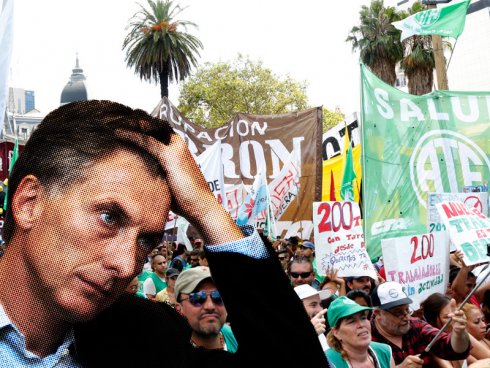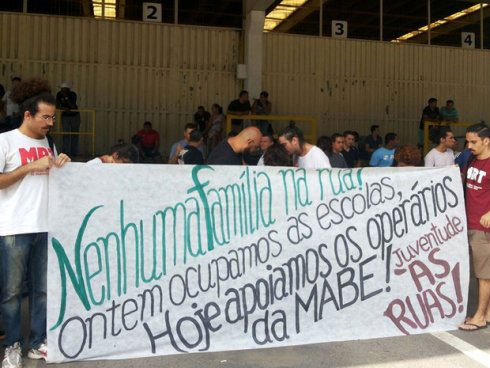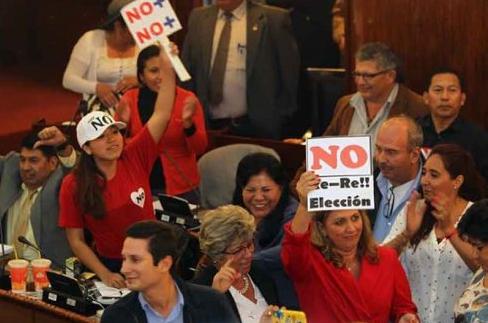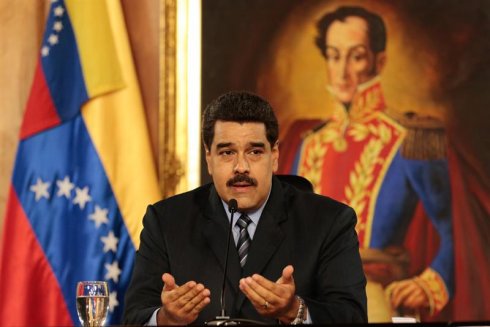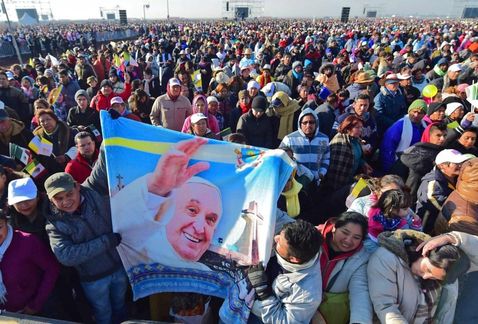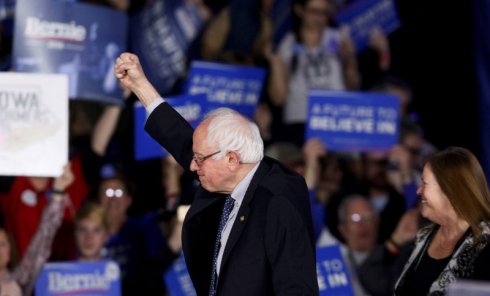Electoral « Earthquake » In Europe
11/06/2014

Electoral « Earthquake » In Europe
From May 22nd to 25th, elections for the European Parliament took place in the 28 member-countries of the European Union (EU). With an persistent and sizeable absention, the election revealed a strong political polarization and a weakening of the traditional parties - socialdemocrats and conservatives. The brutal austerity engaged in the past few years, headed by the Troika, like the ones we’ve seen in Greece, in the Spanish State or Portugal, generated a large rejection of the EU, and of the Brussels’ bureaucracy. This explains much of the electoral outcome.
The great winners were the « eurosceptic » parties (opposed to the EU), the xenophobic extreme-right wing or the so-called « populists ». The prime expression of this phenomena was the victory of Marine Le Pen’s National Front in France, with 26 % of ballots. Also the UKIP (United Kingdom Independence Party), obtaining 32 % of the votes, broke down the traditional bipartisanism of the Labour and Conservative parties. The Danish People’s Party pulled off a 27 %, and the Freedom Party of Austria over 20 %. A openly fascist organization like Golden Dawn in Greece obtain 9,4% and the Jobbik (Nationalist Party) in Hungria beat the socialdemocrats with close to 15 % of the votes. At the same time, it is important to note that in the countries where that type of far-right parties imposed their reactionary message in previous european elections, they fell back. It’s the case in Italy, Belgium and Holland.
On the other hand, various reformist left-wing parties (called « radicals » by the press) significantly grew their influence. In Greece, Syriza reached 26,5 %, that’s 3 points over New Democracy, the governing conservative party. Another « stroke of luck » for the reformist left-wing was in the Spanish State. To be sure, the right-wing Popular Party (in power) won, together with the PSOE (Spanish Socialist Workers Party) with whom he forms the traditional bipartisanism. But they only obtained 49% of the votes, while United Left and the new PODEMOS group, who had different lists, won respetively 10 % and 8 %, becoming the 3rd and 4th political force at national level. In Portugal also, the reformist left-wing in its differents forms obtained some 18 %.
In this situation Germany looks like an « island of stability ». The parties forming the coalition government led by Merkel managed to preserve themselves in the midst of the strong political crisis Europe is going through.
To analyze these results and the political perspective they open, the FT-CI interviewed Ciro Tappeste of the Revolutionary Communist Current (CCR) in the NPA in France, Santiago Lupe of Class against Class (CcC) in the Spanish State, and Stefan Schneider of the Rio Group (RIO) in Germany (european organizations related to the Argentina-based PTS and to the FT-CI).
What are the causes that explain this growth and popularity of the far-right in Europe, particularly in France ?
Ciro Tappeste, CCR : The general cause is exhaustion and social exasperation after over 6 years of economic crisis. While Germany is stepping forward with violent austerity measures [in Europe], the workers movement has not yet answered comprehensively the on-going crisis. Sovereignism (parties who advocate returning to national sovereignty at the EU’s detriment), national xenophobia or anti-immigration is what best capitalized politically on this dissatisfaction. The growth of these forces is a threat to the political order that prevailed since World War 2, which allowed the capitalists’ EU to be build. Although for now the whole of the bourgeoisie has opted for the capitalist globalization, and so far we’re not facing a revolutionary ascent that would imply the use of fascim as a method of civil war against the proletariat and democratic rights. But the crisis of bourgeois democratic representation is immense, so much that in fact there is a discordance right now (it would be something else if the euro collapse) between the economic level and the political one in the EU’s construction. In France, these tendencies are expressed more intensely by the level of rejection of the governing Socialist Party and Holland’s government itself (levels never seen before in the 5th Republic). This is combined with the crisis of the traditional right-wing party (UMP), which is severly weakend by a series of corruption scandals, but more so by its lack of orientation and delimitation concerning the xenophobic right-wing National Front (FN) and the EU itself.
This is what explains that the FN, led by Marine Le Pen, has come out on top of the election. Nonetheless, the triumph occurs under exceptional circumstances, and does not garantee the FN to transform itself into the 2017 presidential election winner. As I said earlier, the context in Europe, the changes inside the UMP and overall the absence of a larger social base that would allow the FN to obtain 50 % of France’s ballots. These are the difficult obstacles that the FN would have to deal with, taking into account also that the ruling class doesn’t yet need a more extreme option to deal with the masses. This said, the result means a reconfiguration of France’s political life. Now the traditional parties aren’t so sure of making it to the second round of the presidential election when facing these casts in favor of the FN.
How does this triumph affect Holland’s government ?
Although Holland’s government can keep governing - thanks to the anti-democratic institutions of the 5th Republic - he’s in a politically unsustainable situation. He’s violently rejected by the people, which opens huge cracks in the governing party and it’s members of parliament. But if the plans until the the 2017 elections are uncertain, the bourgeoisie is more worried about the governmental paralysis that seems to establish itself on the long run. At the same time, the government fears the social unrest and the discredit of traditional mediations. In particular that of the union bureaucracy, who agreed to, or weakly opposed, the « social deals » with the anti-workers governement. The governement fears that all this sparks up movements they can’t contain.
How does the Front de Gauche (Left Front) position itself and what was the far-left’s policy ?
Concerning the Front de Gauche (FdG), it’s predictable that it’s moving towards an important internal crisis. This reformist alliance comprising the PCF (French Communist Party) and Jean-Luc Mélenchon (an ex socialdemocrat MP), along with other minor sectors (like the distinct right-wing splits from the New Anti-Capitalist Party (NPA), hasn’t differentiated clearly from the governing PS (Socialist Party), and it could’nt capitalize the huge discontent towards the government and its electoral collapse.
The NPA, starved of financial means, wasted the last political influence it had by pulling out Olivier Besancenot. He reappeared in this election as head of the parisian region list and reach barely 0,8% with an incomprehensible rhetoric between organizational independance from the FdG and tailling it politically.
In the meantime Lutte Ouvrière (Workers’ Struggle), who appears with a more socialist discourse, sticked to the 2009 results, but is far from it’s electoral « glorious times » when it exceeded 5% of national votes. Also, due to its unionist and electoralist routine, they couldn’t raise the spirits of - or offer another perspective to - the thousands of workers who voted in the election (it should be noted that 70% of those who earn 20.000 euros a year don’t vote), and equally didn’t capitalize on government rejection.
France’s tragedy is that the far-left is short of any offensive strategic policy and they offer no alternative, neither on electoral grounds, nor in the class struggle. It hasn’t given a revolutionnary course to the constant elements of worker and student radicalism that have emerged in the past decades. Consequently, they brought demoralization to tens of thousands of fighters, opening the way for potential long-lasting hegemony of the reactionary forces.
As for ourselves in the Revolutionary Communist Current (CCR), we invest all we can to avoid this dreadful perspective -with some success at a small scale amongst workers and the youth-, which would be a huge subjective step backwards in the country where trotskism emerged strongly in the last uprise of 1968, confronting the stalinist hegemony in the workers’ movement. Replace its defeatist vision of the working class is essential to rearm the far-left’s forces and be ready for the various class struggles that will inevitably come in the next period, even though no one can expect the french working class -with its tradition of struggle- to accept a drop in its living standards without a fight.
How do you see the growth of the « radicals » like Syriza in Greece or Izquierda Unida (United Left) and PODEMOS (We Can) in the Spanish State, and what can the workers expect from these organizations ?
Santiago Lupe, CcC : In the case of Greece - and despite political positions more and more moderate and conciliatory towards the EU - Syriza is still seen as a means of opposing the austerity against which millions of greek workers and youth have been mobilizing in the street for the past few years. The illusions in a future government headed by this organization have led to a reflux in the class struggle. Some far-left groups considered Syriza’s electoral successes and the possibility that it takes power to possibly strengthen and be a boost to workers and popular mobilization. But - and thanks also to the union bureaucracy’s policy that led the protests in deadends and wasted energies – the growing illusion concerning Syriza and its reformist program - already abandoning the demand of no payment of the dept – serves as a deviation.
Here in the Spanish State, the growing divorce between hundreds of thousands of youth and popular sectors and the political regime, that aggravated in the three years following the 15M (mass mobilizations that started on March 15th of 2011 against austerity, result of the economic crisis and in which emerged the « indignados » movement) and that now combines with the emergence of strong struggle in the workers movement like Panrico and Coca-Cola. This discontent had been partially canalyzed towards elections by Izquierda Unida (a reformist coalition led by the Spanish Communist Party that implements austerity alongside the PSOE - Spanish Socialist Workers Party- in Autonomous Communities like Andalusia) and in some historic nationalities was canalyzed by the forces of the pro-indenpendence left-wing. But in the last election, adding to the fact that Izquierda Unida (IU) has improved its results, a new organization has emerged, PODEMOS (headed by the TV front man Pablo Iglesias). It holds discourses against the political cast, exploiting the rejection of the traditional parties and collected 8 % of the votes, against 10 % for IU. The ballots on the PSOE’s left sum up to 22 % while the PSOE itself obtained 23%. There is barely any difference between PODEMOS and IU’s programs, except that PODEMOS expresses populist positions aiming at attracting ballots from the center, like the demand of national sovereignty or the support to the « progressist » sectors of the Police and the Army. Their list, led by Iglesias, secured the votes of an important fraction of the youth, of social activists and public servants who protagonized the 15M movement, the movement against evictions and the « tides » against cuts in health care and education.
At the same time, the leaders of IU and PODEMOS are already talking agreements for next years’ local elections. For now PODEMOS is a purely electoral phenomenon. The evolution of these phenomena depends on how the situation evolves, and on the emergence of clearer tendencies towards political radicalization that will probably contradict the reformist and conciliatory orientation of these projects.
How do you consider the results in Germany and what is the political perspective that opens up with the new European Parliament ?
Stefan Schneider, RIO : The electoral results in Germany express the stability of the regime and of the Great Coalition between the conservative party of Angela Merkel and the socialdemocrats. This coalition can - and is going to - be used to strenghten Germany’s hegemony over the rest of Europe, and against the german workers.
But there’s a sector of the german bourgeoisie and petty-bourgeoisie that is opposed to assuming greater « responsability » in Europe, and that is more openly nationalist and right-wing populist. The clearest example of this is the « Alternative for Germany » party (AfD) that emerged last year. It almost entered the German parliament and collected 7 % of the votes in the european elections.
Another important element for the balance sheet of these elections is the result of Die Linke (The Left) that reached a 7,4 %. This left-wing reformist party doesn’t oppose the imperialist UE, but hopes to « better » it, and therefore can’t mean any alternative to the right-wing « eurosceptic » parties. Only by building a real far-left and workers’ alternative will we be able to defy the ruling class, its parties and oppose the false alternative between the Capital’s EU and the return to the old national states, raising the banner of the Socialist United States of Europe.
Do you have any fresh news from the Panrico and Coca-Cola struggles ? And how can the workers use the electoral results ?
Santiago Lupe, CcC : Both struggles are living through crucial times. Comrades of Coca-Cola continue their strike in Fuenlabrada and their almost daily mobilizations. In the past few weeks, they had to face various attempts of driving trucks inside to get supply out of the factory. On June 3rd, they will face a trial for contesting the lay-offs.
In Panrico they had to deal with the court’s sentence for contestation. The sentence was pronounced as an example, it confirmed the lay-offs of 2013-2014 and the wage cuts. So the bureaucracy tried to end the strike and the company hoped to step up even more, anouncing it would lay-off the Work’s Council and the activists. But the Panrico workers answered with a outstanding « We stay on strike and ready for war ». Something unheard-of in the Spanish State, the continuation of a strike after it was sentenced. Their determination forced the Company to call for new negotiations and the Autonomous Government to try to mediate again.
On May 30th there will be new attempts from both struggles to fraternize. We will be there with the CcC as part of our active solidarity with these struggles. We’ve supported them actively from the first day on with a national and international campaign.
These struggles question the union bureaucracy’s policy and also the policy of a large part of the left, who neglect the importance of the workers movement and the militancy in workplaces to help them emerge as an independent force.
We believe that this is the challenge we face now and in which revolutionaries have to invest all their strength. Find the ways for the workers’ struggles to gain their own political expression. In this sense the electoral results show some movement towards the left, but it’s still towing projects with reformist and class conciliationist programs. It’s necessary to be able to regroup the sectors of the far-left – those who don’t support these projects - with the vanguard of the working class and youth. They need to reach the understanding that there is to move from social struggle to political struggle, to fight for political class-independence and a revolutionary program.

